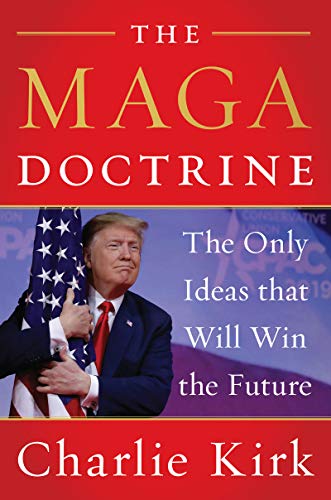
Charlie Kirk’s The MAGA Doctrine: The Only Ideas That Will Win the Future is an unapologetic exploration of the principles behind Trump-era conservatism. Written by the founder of Turning Point USA, this book sets out to explain the intellectual and philosophical backbone of the “Make America Great Again” movement and why it resonates so deeply with millions of Americans.
At its core, The MAGA Doctrine argues that Trumpism is not a personality cult, but a restoration of self-rule by ordinary citizens long dismissed by political elites. Kirk paints Trump supporters not as blind followers driven by emotion, but as defenders of ideas rooted in the American founding: nationalism, individual liberty, and skepticism toward globalism. For Kirk, nationalism is not a dirty word but a necessary antidote to a world order that he claims has eroded American strength and self-determination.
Stylistically, the book mirrors its subject bold, confrontational, and fiercely loyal to its vision of America. Kirk’s tone is confident and direct, often echoing Trump’s assertive communication style. He sees The MAGA Doctrine as both a rallying cry and a roadmap for young conservatives seeking to push back against what he perceives as liberal domination of media, education, and culture.
Supporters of the book, like reviewer Jim Brown, see it as a powerful affirmation of American values. Brown calls it a “history book on politics prior to 2016” and praises its clear structure and straightforward style. For him, the book offers an essential reminder of what the Constitution and Bill of Rights truly represent. He describes it as not just a political commentary but a reflection of shared patriotism a vision of America he deeply identifies with. In his words, The MAGA Doctrine captures “what makes Donald Trump tick” and why his movement struck a chord with millions who felt ignored by the establishment.
On the other hand, critics like Melanie approach the book with skepticism. She acknowledges that Kirk’s writing helped her better understand Trump’s appeal, but also points out what she sees as selective reasoning. While Kirk praises Trump’s defense of free speech and deregulation, Melanie argues that the book glosses over contradictions between Trump’s words and actions, particularly in his treatment of the press and his handling of government oversight. She views Kirk’s arguments as persuasive in tone but lacking in nuance, often stretching partial truths into sweeping generalizations.
Taken together, these contrasting perspectives highlight exactly what makes The MAGA Doctrine a fascinating, if divisive, read. For conservatives, it’s a manifesto affirming their beliefs and offering intellectual grounding for the populist movement that redefined the Republican Party. For skeptics, it’s a revealing window into the mindset of Trump loyalists a book that explains, if not entirely justifies, the emotional power of MAGA politics.
Regardless of where you fall on the political spectrum, The MAGA Doctrine is a book that forces readers to confront the changing landscape of American conservatism. It’s not just about Donald Trump it’s about the cultural and political realignment his presidency unleashed.
If you’re looking to understand the ideas shaping the future of the Republican Party, this book is a must-read.


